|
Our
film opens on a highway leading into
Northville, Michigan, where an elderly
couple are sidelined with a flat tire. Soon,
they are surrounded by a horde of bikers.
And though things appear ominous as they noisily
swarm all over the car, things are not
as they seem. See, the Spirits aren't about
that kind of thing, man, and soon have the
flat off, the spare on, and send the
couple peacefully on their way. Bluntly in
the face of this act of altruism, the
Spirits are then stopped at the Northville
city limits by the police and summarily rousted,
hassled, and jailed on several bogus
charges just because of who and what they are.
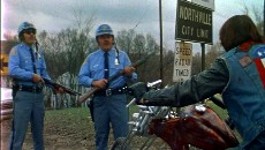
And
here we have the entire theme of the film
wrapped up in a nutshell. So you could
stop now, but, stick around, the film is
just warm'n up...
However,
the
Club actually celebrates their incarceration by
sharing the pot Chris,
a hitchhiker they picked up on the way
into town, managed to smuggle in. Seems
Chris (David
Hyry and voiced by Nick Nolte) is
a local, making a less than triumphant
return after his tour in Vietnam to see
his girl, Lynn. One should also note that
Chris appears to be a
long-haired hippie; and hippies and bikers
are like oil and water, right? But the
Spirits don't hassle him -- after all,
it's his pot, and this mongoloid menagerie
tokes the night away.
Come
the dawn, after
being sentenced to a wash and wax at the
local car wash (--
much to the locals amusement),
the Spirits are escorted out of town. At
this point, Chris peels off, finds Lynn (Jan
Sisk) and invites her to a wedding -- Spirits
style, which is taking place in an open
pasture up the road apiece. And while the majority of the
bikers scrum for the garter belt, Chris
and Lynn sneak off to a nearby barn for a
roll in the hay. (And at this point
I have to pause and say that Ms. Sisk --
or maybe the actress dubbing her over, has
all the acting skills of an avocado; but
bless her, she tries real hard. Nice rack,
though.) But
no matter where the Spirits go, Johnny Law
never seems too far behind and the bikers are
soon sent packing again. Thus, Chris and Lynn
are left alone in
the barn, where they have the misfortune of
being discovered buck-naked by a sadistic
little sociopath with a badge named Putnam
(Craig
Collicott), who quickly bludgeons Chris unconscious with
the butt of his shotgun, and then turns a
lecherous eye on Lynn. Oozily, with his
pants around his ankles, everything else
soon follows; and once the dirty deed is
done, Putnam continues to beat on Lynn,
threatening that if she doesn't say it was
the bikers who raped and brutalized her,
he'll kill Chris and slice her face to
ribbons...

Film-buffs
always argue over where a particular genre
started. Some say the outlaw biker flick
began with Brando's The
Wild One;
others say it was Roger Corman's The
Wild Angels.
Most, but not all, agree the genre reached
its zenith with Easy
Rider --
personally, I say it was Satan's
Sadists,
but almost everyone agrees the genre
officially died with Northville Cemetery Massacre.
More Easy
Rider
than Chrome
and Hot Leather
(--
and
what a stinky piece of poop that film was),
the film is a lot more blunt with its
message on the dangers of misperceptions
based solely on what you see and what you think
you see.
Northville
Cemetery Massacre
had a -- well, interesting birthing
process from script to screen. Inspired by
the works of Hunter S. Thompson and Sam
Peckinpah, first time filmmakers William
Dear and Thomas Dyke (--
who co-wrote, directed, shot, and edited --)
began production on the originally
titled Freedom R.I.P. in 1971; and
due to a constant lack of a budget, the
film was shot piecemeal over the course of
almost two years. Their cast consisted
mostly of a local Detroit club called The
Scorpions. Making contact with them
through a friend of a friend who was a
member, the only thing the filmmakers had
to show the bikers of what they were
capable of, film-wise, was an anti-drug
educational short they'd just finished
called Jump.
Nobody knows if it was the quality of the
film or the kahonies it took to show an
anti-drug short to that crowd, but the
Club signed on. And according to Dyke, it
was several "encouraging" calls
from the Scorpions to "Keep on keepin'
on" that got the film finished so
they could all get paid. (I
assume they were promised a piece of the
pie.) The cast was then rounded out by
several local actors, who range from good
to passable to downright awful and, to be
honest, the amateur thespian bikers handle their lines
better than anyone else.

When
filming was finally completed in 1974, it
took almost another two years to complete
post-production. Editing began in New York
until they ran out of money. Vacating
those facilities, the production moved to
Los Angeles, but upon arrival, they discovered most of
their negatives were missing, which were
back in New York and wouldn't be returned
without payment (--
seems they skipped town without paying
rent). A red-eye back to New York
and a midnight raid (-- since they
still had a key --) on the editing
studios didn't turn up their film but they
did find a copy of the newly finished Fritz
the Cat,
which they pilfered and eventually traded
back for the much needed negatives.
The
negatives were okay, but the audio track
was a shamble and work commenced to try
and salvage it. Former Monkee Mike Nesmith
provided the soundtrack. Approached at a
gig and shown the film, he -- according to
Dear, thought it was awful but still agreed
to score it and serve as the occasional
balladeer. Next, Nick Nolte was approached
the same way and agreed to dub over Hyry
over a free beer and a promise of $150.
With
their film finally complete, they found a
distributor with Roger Corman's Cannon
Films, but then ran into a snag with the
MPAA, which threatened to scuttle the deal
when
Northville Cemetery Massacre
was
slapped with an X-rating for its
gratuitous violence. After making some
cuts, the filmmakers appealed the rating
and won an R. And with that final obstacle
cleared, Cannon released the film in 1976,
and Freedom
R.I.P.
finally hit the theaters. Now whether that
title means Freedom:
Ride in Peace
or
Rest
in Pieces
kinda depends on how the rest of the film
plays out as Putnam
stays ahead of his lie by personally
escorting Lynn to the hospital.

Scared of
him, and what he might do to Chris, Lynn
refuses to tell her father, John Tyner (Herb
Sharples), what really happened.
But Putnam is -- his version of the truth,
anyway. Laying the blame on the Spirits,
Putnam presses things further, stoking
Tyner's need for revenge, by saying
they'll never be able to prove what
happened due to a "lack of
evidence." And he keeps pushing the
father's buttons until Tyner is well past
the point to kill, and more than
willing to help eradicate those animals
who hurt his daughter. Putnam then seeks
out one more person for his crusade: a
local businessman with a Count Zaroff
complex named Armstrong (Len Speck),
who's more than happy to help hunt and
kill the most dangerous game.
And
be sure to enjoy his wonky justification
speech about culling the herd. Wow...
Later,
at the Spirits' Clubhouse, the wedding is
finally winding down; and while Chris
relates to Deke (Carson
Jackson), the club's president, how the cops attacked him and Lynn
in the barn, and how he woke up to find
everyone gone, a couple members step
outside to take a whiz -- 'cuz you don't
buy beer, you only rent it. But they're
barely outside the door before both fall
-- very messily, to a sniper's bullet.
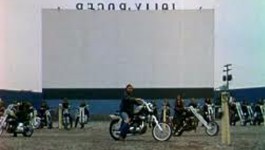
Thinking
at first that a rival gang was behind the
ambush, Deke sets up a meeting with The
Road Agents at an abandoned drive-in
theater to settle things. When the Agents
deny any involvement, this is quickly
verified when the sniper strikes again,
taking out bikers from both sides. Never
leaving a man behind, the bikers pull the
wounded and the dead onto their bikes and
haul ass out of there. But before getting
clear, the Agent's leader
takes one in the leg, leading to some
impromptu surgical procedures in a gas
station restroom.
I'm
gonna assume Chris was a medic in Vietnam
-- or at least the guy with a bullet being
pried out of his leg better hope he was medic in
Vietnam...
Whoever
it is attacking them, they're packing some
pretty high caliber heat. Knowing they're
outgunned, Deke leads the Spirits into
Detroit to see Captain Freedom (Ray
Gardener), a whack-o radical who
runs guns out of his garage. All of his
automatics are "spoken for" but
the Captain tops off their order with
several hand grenades to make up for it.
Then, on
the way back to Northville, any doubts
about Putnam's manhood are put to rest
when he ambushes a lone Spirit, broken
down on the side of the road. He spills
and spells out his psychosis first, and
it's depressingly familiar, before blowing
a hole in the other man's chest ... Suspicious
of psycho Putnam from the beginning, Chris
has this confirmed when Lynn finally
reveals what happened in the barn. Aware
of what's been happening, she also fears
her father might have something to do with
the ambushes. Chris agrees, but feels Putnam is the
root cause of everyone's grief and is
ready to kill him for what he's done. Lynn
doesn't think he should (--
or could --) kill anybody, but promises
to tell her father the truth and that will
be the end of it.
She
never gets the chance.
Things
reach a climax at the Northville Cemetery,
where a procession of bikes and hearses
wind their way to the secluded spot. One
of the hearse drivers has the ballgame on,
and as the National Anthem plays, it gives
you the sense that something very
gladiatorial is about to happen. Sure
enough, as the Spirits try to bury their
fallen comrades, the cemetery is buzzed by
a Armstrong's helicopter. On board,
Armstrong, Tyner and Putnam open fire,
but the Spirits are ready for them.
Breaking open the coffins, that are filled
with the weapons they got from Captain
Freedom, the bikers quickly return fire.
Chaos reigns and the blood flies, but unfortunately, the Spirits prove better
targets than marksmen.
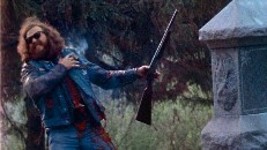
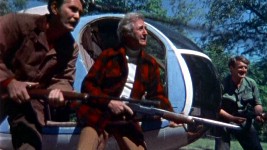
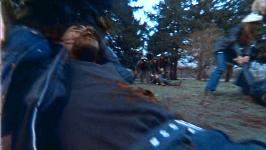
After
several sweeps, it appears the mercenaries
got everyone. Landing the chopper, the
men get out to make sure and mop things
up. But this time, they're the ones who
are ambushed as the Spirits still kicking
were playing possum. Another firefight
erupts, and as the helicopter and its
pilot are taken out with several hand
grenades, Chris moves around to try and
help the wounded until he takes one in the
shoulder. Again, though the Spirits have them
outnumbered, Armstrong, Tyner and
Putnam take cover and pick the bikers and
their old ladies off one by one until none
are left standing. Well, not quite all; Deke
manages to get to his bike and takes out
Armstrong -- how exactly I'm not sure, but
trust me, he's dead -- before he falls in
a hail of bullets.
Then
all is quiet.
Lynn
arrives on scene, too late, and tearfully
confesses that all this carnage was for
nothing. The Spirits didn't hurt her. She
then angrily points at Putnam, and says
he's the one who raped her. Putnam replies
by blowing Tyner away. Hearing a shotgun
being racked behind him, Putnam turns to
see that Chris -- bloodied but still
kicking, has the drop on him. And after
a brief Mexican stand-off, we have a
close-up of a trigger-housing, a finger
twitch, and the sound of a gun clicking
empty. But whose? As the stand-off
silently continues, we switch to an aerial
shot to view the carnage and fade to black
before we get an answer.

The
End
Now
it is that concluding, almost operatic,
bloodbath that has cemented
Northville Cemetery Massacre's
status as a cult movie. Dear and Dyke
wanted to keep the ending ambiguous -- and
it took me three viewings to realize whose
gun clicked empty. From the editing, to
the slow-motion shoot-outs, to the
volcanic blood squibs, the filmmakers were
definitely big Sam Peckinpah fans. These
nasty squibs were done on the cheap and on
the fly, consisting of baggies of fake
blood and illegal firecrackers strapped to
their actors and actresses chests -- who
risked life and limb and ear-drum to get
the shot. One of the film's sponsors was
place called Burger Chef, who
provided food for the production, and most
of the leftover burgers were mangled up
and added to the concoction to make the
hits more messy. I'm amazed at how well it
worked. This appears to be Dyke's only
production, but Dear went on to have quite
a career, helming Harry
and the Hendersons,
one of my all time favorite bigfoot
movies, and also directed Mummy
Daddy,
thee greatest episode of Amazing
Stories ever;
that's the one where the actor, trapped in
his mummy costume, tries to get to the
hospital for the birth of his daughter --
if the locals, thinking he's a real
monster, don't kill him first.
It
was Cannon Films that changed the name
from Freedom
R.I.P.
to
the more lurid Northville
Cemetery Massacre,
and that wasn't the only change they made.
A lot of the satire and comedy scenes were
left on the edit room floor (--
about eight minutes worth --) but
all the blood and violence was left in.
Now VCI Entertainment has managed to
cobble it all back together in a spiffy
new DVD marking the
film's 30th Anniversary. And again, VCI
has packed their DVD with a ton of extras,
including three separate commentaries: one
from Dyke, one from Dear and one by the
surviving Scorpions. They're all a hoot.
Personally,
at heart, I think Northville
Cemetery Massacre
is a western (--
another genre that was dying out by the
mid-70s.) The Spirits are cowboys
out of time, with no place left to roam in
this world, and the script had some lofty
ambitions to show that the
perception of reality is reality. At
the time filming commenced the
counter-revolution of the '60s was
fizzling out and Nixon was on his
get-tough law and order kick; a bad time
to be a disillusioned freak just wanting
to wear your colors, ride you scooter,
smoke, drink and screw without being
hassled by the man. Dear and Dyke's goal
was to satirize this notion by making the
bikers the good guys and the clean-cut
cops the bad guys. (And I think it
would have been made better if the the
club had remained The Scorpions and not
changed to the more milder Spirits.) Things
get more complicated when you realize most
of the "bad guys" in this film
act the way do only because Putnam is
manipulating them. All of the chaos and
bloodshed that follows is based on a lie,
to feed and fuel Putnam's psychotic
bloodlust under the excuse of a crusade
against the outlaw bikers. And once the
others buy into that lie (-- some
happily, others reluctantly),
everybody's screwed. A strong metaphor for
the time, that still has some resonance
today. So despite
all the technical hiccups and gonzo
execution, when it's all said and done, Northville
Cemetery Massacre
has a lot to say about society and its
ills; and despite a limited budget, a bane
of rudimentary acting skills, and an
atrocious audio track, it says those
things pretty darn well.
|